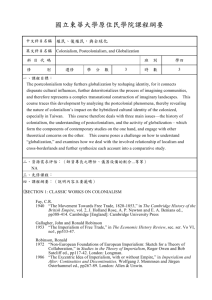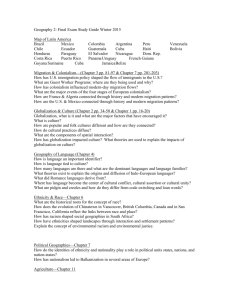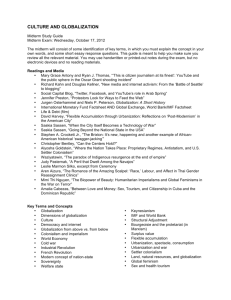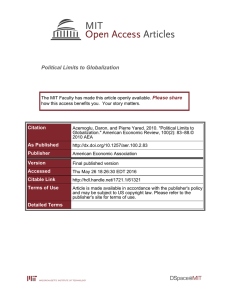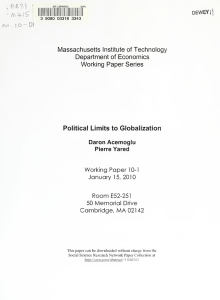Interview Notes—Harmony Goldberg, SOUL
advertisement
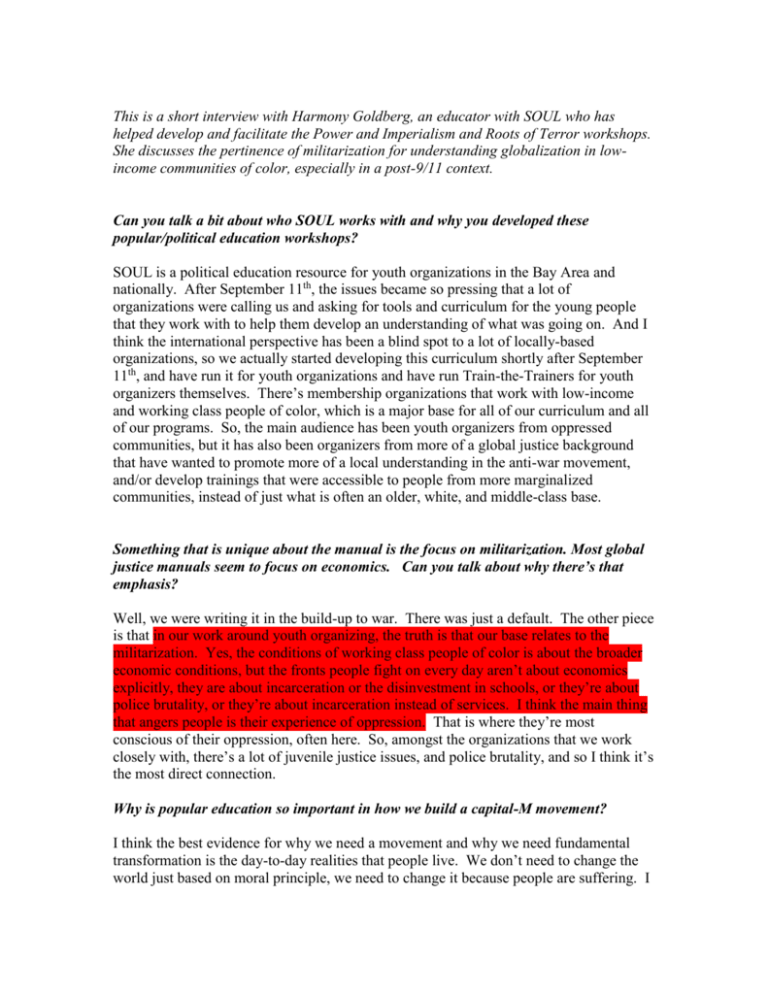
This is a short interview with Harmony Goldberg, an educator with SOUL who has helped develop and facilitate the Power and Imperialism and Roots of Terror workshops. She discusses the pertinence of militarization for understanding globalization in lowincome communities of color, especially in a post-9/11 context. Can you talk a bit about who SOUL works with and why you developed these popular/political education workshops? SOUL is a political education resource for youth organizations in the Bay Area and nationally. After September 11th, the issues became so pressing that a lot of organizations were calling us and asking for tools and curriculum for the young people that they work with to help them develop an understanding of what was going on. And I think the international perspective has been a blind spot to a lot of locally-based organizations, so we actually started developing this curriculum shortly after September 11th, and have run it for youth organizations and have run Train-the-Trainers for youth organizers themselves. There’s membership organizations that work with low-income and working class people of color, which is a major base for all of our curriculum and all of our programs. So, the main audience has been youth organizers from oppressed communities, but it has also been organizers from more of a global justice background that have wanted to promote more of a local understanding in the anti-war movement, and/or develop trainings that were accessible to people from more marginalized communities, instead of just what is often an older, white, and middle-class base. Something that is unique about the manual is the focus on militarization. Most global justice manuals seem to focus on economics. Can you talk about why there’s that emphasis? Well, we were writing it in the build-up to war. There was just a default. The other piece is that in our work around youth organizing, the truth is that our base relates to the militarization. Yes, the conditions of working class people of color is about the broader economic conditions, but the fronts people fight on every day aren’t about economics explicitly, they are about incarceration or the disinvestment in schools, or they’re about police brutality, or they’re about incarceration instead of services. I think the main thing that angers people is their experience of oppression. That is where they’re most conscious of their oppression, often here. So, amongst the organizations that we work closely with, there’s a lot of juvenile justice issues, and police brutality, and so I think it’s the most direct connection. Why is popular education so important in how we build a capital-M movement? I think the best evidence for why we need a movement and why we need fundamental transformation is the day-to-day realities that people live. We don’t need to change the world just based on moral principle, we need to change it because people are suffering. I think that’s the most consistent basis to build a movement from, so I think it’s important to pull that experience out. And, I think the energy that you can create by helping people to understand their own power in an educational context is the energy that can motivate and drive a movement. And why do you think pop ed brings that out instead of institutional education? I think people need spaces where they can understand that they have knowledge and power instead of thinking that they need to get knowledge and power from somewhere else. Do you think that the Global Justice Movement has been successful in the last five years in addressing some of the gap in diversity and representation? I think it’s a mixed yes and no. I feel that the GJM has advanced in its analysis of globalization, that there is a better understanding now that globalization didn’t start with the WTO, but in fact has a long history of colonialism and imperialism. And I think people have become more conscious of the need to be related to and accountable to the organizing that happens in the communities that are impacted by imperialism and colonialism here. But a challenge that has come up repeatedly, that I don’t think we’ve solved, is that there’s a desire to be accountable to communities, but there’s not really an understanding of what that means on either side’s part. Take the Republican National Convention process for example, the reality was that the community based organizations couldn’t drop everything to lead these protests. But then you have the direct action movement sorta waiting, and so no one leads. And so, just stepping back and letting go, waiting for people to step in when it is not their main area of work, is not a solution. And so to me, we’ve come to consciousness, but haven’t come up with a solution of how this plays out or applies. It’s not just ‘integrate the global justice movement’ and it’s not ‘stop and wait for other people to replace you’. The global justice movement should be mobilizing the people. That’s great. But they should do it in an anti-racist way. Do you think people of color and immigrants are particularly well-positioned to take leadership roles in the global justice movement, in a post- 9/11 world? I think that in general the most consistent leadership in social movements comes from people that are impacted by the issues. The issues that working class people and people of color face here in the U.S. are not just connected to the global process of poverty and violence. I think they have the most shared experience with people in the third world, with poverty and violence. More shared experience as a basis for solidarity and history. There’s a lot of history and historical consciousness that people have to tap into. Mainstream education doesn’t pull that out, but popular education does, whether you’re talking about colonization, or slavery, or people being forced out of their homes. And, you find that in particular with immigrant communities. And after Sept. 11th, just the heightened nature of the U.S. repressive apparatus brings particular communities to the forefront, especially South Asian and Arab folks. But, I think it’s true across the board.
